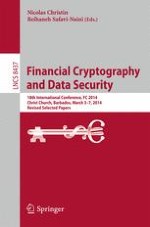2014 | OriginalPaper | Buchkapitel
Efficient and Strongly Secure Dynamic Domain-Specific Pseudonymous Signatures for ID Documents
verfasst von : Julien Bringer, Hervé Chabanne, Roch Lescuyer, Alain Patey
Erschienen in: Financial Cryptography and Data Security
Verlag: Springer Berlin Heidelberg
Aktivieren Sie unsere intelligente Suche, um passende Fachinhalte oder Patente zu finden.
Wählen Sie Textabschnitte aus um mit Künstlicher Intelligenz passenden Patente zu finden. powered by
Markieren Sie Textabschnitte, um KI-gestützt weitere passende Inhalte zu finden. powered by
